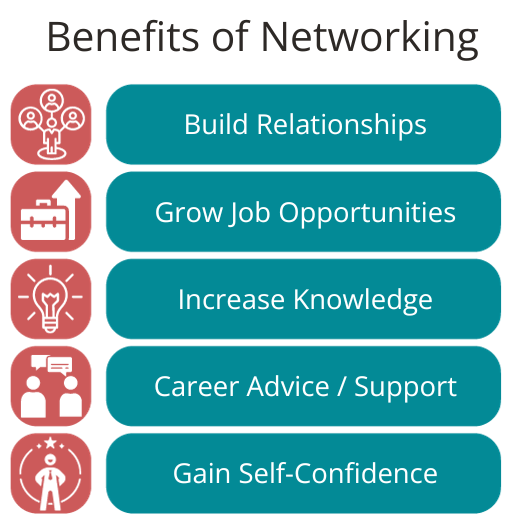Networking in College and Beyond

Find ways to start building your network of professional connections, and how to foster those relationships.
About Networking
Have you ever thought about the advantages of networking and wondered where to start? It’s not enough to send friend requests on social media, or even add your coworkers on LinkedIn. Networking requires dedication, time, and stepping outside of your comfort zone. Keep reading to learn the basics of networking, and how it can be especially beneficial if you are in college and/or looking to enter or re-enter the workforce.
Check out this article for additional benefits of networking.
Networking During and After College
Consider how many college clubs are available to you. Reflect on how many class projects have required collaboration on a team. Remember all the emails you’ve sent and meetings you’ve had with your professors. All these resources can add to your network of connections, and increase the size of your support system. You may also have the opportunity to benefit others in the process by being part of their network.
Ways to Network
Actively Participate in Social Events / Organizations
- As mentioned earlier, college provides numerous opportunities to connect with your peers and gain mentors, especially by joining clubs. Not only will you get to meet fellow students, but you may also come across alumni and professors who have a hand in managing these clubs. These acquaintances can be invaluable resources as you enter the workforce, as alumni have been where you are, and can provide tips on how to start your search. Additionally, you can explore other events such as study groups, career fairs, and campus activities to further expand your network and boost your career prospects.
Utilize LinkedIn
- If you haven’t already, consider creating a LinkedIn profile. Many employers utilize LinkedIn to find out more about job candidates and their professional background. While having a resume is important for showcasing your work history and experience, LinkedIn takes it a step further by demonstrating your networking abilities. When employers see that you are connected with professionals from a variety of industries, you’ll appear more credible and well-rounded. It’s a small world, you never know who might know who! Imagine if an employer happens to also be connected with someone from your network. This could greatly increase your chances of becoming a candidate of interest.
- It’s important to keep your LinkedIn profile up to date. Are you considering a career change? Make sure your profile gives an updated description of the field you’re looking to transition into. Are you actively seeking job opportunities? Make sure to provide that status on your profile so employers can more easily find you. Keep your profile photo professional, and when sharing content, ensure it follows LinkedIn guidelines. Remember, this is a professional platform and not a place to display selfies or pictures from last night's party. Examples of appropriate content to share include the following:
Check out this article for additional content ideas, inspired by LinkedIn Editor in Chief, Tequia Burt.
Stay Connected / Reconnect
- Oftentimes, it’s easier to make connections than to remain connected. Simply adding people to your LinkedIn profile is not enough. To truly consider someone a part of your network, it’s imperative that you remain actively engaged in communication. It’s not always possible to touch base with everyone on a weekly or monthly basis. Because of this, get comfortable with reaching out to those you haven’t spoken to in a while, and provide them with a brief recollection of your shared connection, such as being a former school colleague, coworker, or club member.
- To achieve networking success, it’s essential to find a balance between quantity and quality. By setting goals to establish a specific number of new connections within a designated time frame, you’ll grow your numbers more quickly. This is especially beneficial when there are upcoming events that provide networking opportunities in-person. The more people you know, the higher chance you have of being introduced to more connections. Consider what knowledge they might be able to provide you, and what you can offer in return.
Go the Extra Mile
- It is equally crucial to maintain strong relationships with your existing contacts and keep them engaged in your network. For those connections you feel most comfortable and familiar with, ask for their preferred form of communication. Some individuals may prefer LinkedIn messaging, while others may appreciate a more personal approach, such as a phone call or direct email. By making an effort to accommodate their preferences, you increase the likelihood of them being more receptive to your correspondence.
Check out this article for more ways to successfully network.
Conclusion
Building your network of connections has many benefits. This professional support system provides you an opportunity to benefit from others’ experiences, and become more confident in what you have to share. When exploring new career opportunities or transitioning between job fields, it is crucial to establish a network of individuals who can assist you in achieving your goals.


